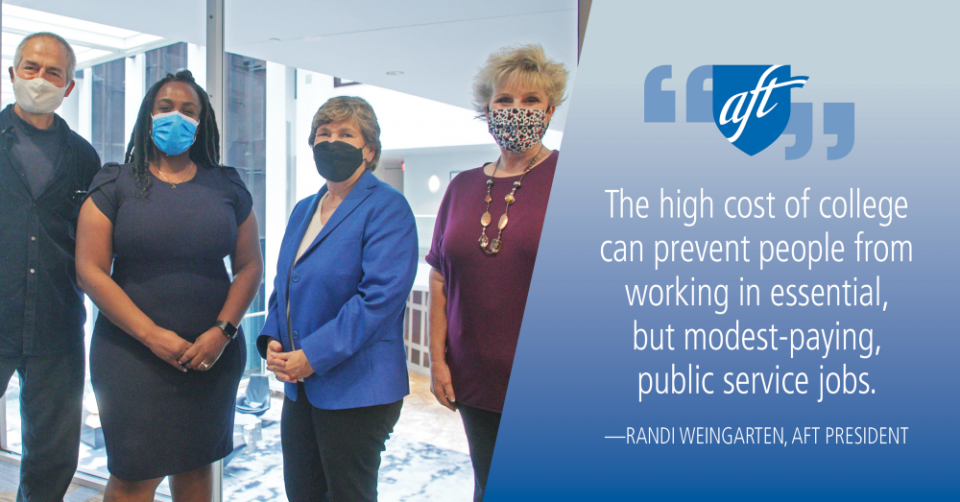After years of pressure and lawsuits from AFT and other advocates, the U.S. Department of Education recently announced sweeping changes to the Public Service Loan Forgiveness (PSLF) program that will make it easier to qualify and easier to achieve forgiveness.
On October 13, AFT President Randi Weingarten and eight AFT members announced a settlement with the Department of Education in the groundbreaking case Weingarten v. DeVos, filed in July 2019 to hold then-Secretary of Education Betsy DeVos and the Education Department accountable for failures to manage the federal Public Service Loan Forgiveness program.
Since the creation of the program in 2007, 98% of all borrowers who have applied for PSLF have been denied. With this settlement, every one of those borrowers’ PSLF applications will be reviewed and will be given a process through this new review procedure, as described below.
AFT expects this review to result in complete discharge for tens of thousands of student loan borrowers across the country, including teachers, nurses, firefighters and others eligible for PSLF.
For a limited time only through October 31, 2022, the Department of Education is offering a “Limited PSLF Waiver” to count previous payments that were previously ineligible because of loan types or repayment plans. This will help thousands of borrowers who were denied forgiveness in the past and could now be eligible to have their entire loan balance wiped away.
This important settlement creates significant structural changes in how PSLF will work, and will help ensure that millions of public employees receive the loan forgiveness they were promised. The Department of Education has agreed to the following:
- Reconsider upon request the application of any borrower who applied for PSLF or Temporary Expanded Public Service Loan Forgiveness (TEPSLF) and was denied, including borrowers with Federal Family Education Loans (FFEL). Borrowers will now have an official process to contest these determinations, unlike in the past.
- Review, within 90 days from today, all applications for PSLF or TEPSLF denied prior to November 2020 submitted by borrowers with at least 10 years of repayment on a Direct Loan.
- Give borrowers whose applications are denied again detailed notices that include the reason for denial, the number of remaining PSLF payments before they are eligible for forgiveness, how to determine which payments are qualifying, and a contact person to speak with should they have questions.
According to the AFT, more information will be forthcoming in the weeks and months ahead, including changes to streamline the application process. The long-term structural proposals will take longer to be approved and implemented. The good news is that things are moving in the right direction to make student loan forgiveness easier and more accessible to borrowers.
- If you are a borrower who may be affected by this settlement and a current AFT member: The AFT will help you navigate this new process with our partner program named Summer. Working with Summer, AFT members already have saved $500 million on student loans, and Summer helps AFT members take the steps necessary to qualify for PSLF. AFT members can sign up for a free account with Summer here.
- If you are a borrower who works in public service and you want to get individualized help from a PSLF expert, you can join the AFT as an associate member now and access a Summer account.
- If you have questions or would like to host an AFT Student Debt Clinic for your local union to help members learn how to access PSLF, email debtclinics@aft.org.
CFT members helped contribute to this victory by facilitating student debt clinics for hundreds of CFT members over the last few years, resulting in many people getting the help and support they needed to get on the right path to PSLF.
Through those clinics, the Organizing Department identified several California members who ultimately worked with AFT to advocate for the overhaul of PSLF. They participated in a critical lawsuit against Navient (resulting in the company no longer servicing student loans due to their predatory practices), visited elected officials, talked with reporters, and shared their personal experiences to give a public face to the failed loan program and its profound effect on student borrowers.

